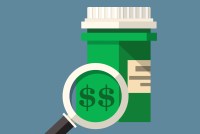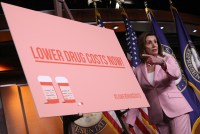Latest Morning Briefing Stories
Must-Reads Of The Week From Brianna Labuskes
Newsletter editor Brianna Labuskes wades through hundreds of health care policy stories each week, so you don’t have to.
Pharma Sells States On ‘Netflix Model’ To Wipe Out Hep C. But At What Price?
Manufacturers of lucrative drugs say they’re offering discounts off the high sticker prices ― but taxpayers footing the big bills might never know what the state is paying or if it’s getting a good deal.
Must-Reads Of The Week From Brianna Labuskes
Newsletter editor Brianna Labuskes wades through hundreds of health care policy stories each week, so you don’t have to.
KHN’s ‘What The Health?’: Democrats Do Drugs (Prices)
House Democrats start legislative work on House Speaker Nancy Pelosi’s prescription drug pricing bill; health is again a featured player in the Democratic presidential candidate debate; and courts around the country hold up President Donald Trump’s health agenda. This week, Margot Sanger-Katz of The New York Times, Tami Luhby of CNN, and Joanne Kenen of Politico join KHN’s Julie Rovner to discuss these issues and more. Plus, for “extra credit,” the panelists recommend their favorite health stories of the week.
Health Care Stayed Front And Center At Democratic Debate
The topic, which polls show is top of mind among voters, kept returning throughout the fourth debate of Democratic presidential candidates.
Think ‘Medicare For All’ Is The Only Democratic Health Plan? Think Again
The Democratic presidential candidates have hit hard on health care, but generally the debates have centered on what kind of system candidates propose. The candidates’ ideas on many other issues, such as mental health and gun safety, have attracted much less attention.
California’s New Transparency Law Reveals Steep Rise In Wholesale Drug Prices
Pharmaceutical companies raised the wholesale cost of their drugs by a median of nearly 26% from 2017 to early 2019, according to California’s first-ever report stemming from a new drug price transparency law. Prices for generic drugs rose nearly 38% during that time.
Must-Reads Of The Week From Brianna Labuskes
Newsletter editor Brianna Labuskes wades through hundreds of health care policy stories each week, so you don’t have to.
Medicare: comienza la inscripción sin una herramienta popular para comparar precios
El viejo buscador de planes proporcionaba grandes ahorros, según expertos. Pero luego de un rediseño, perdió muchas de sus funciones clave.
As Medicare Enrollment Nears, Popular Price Comparison Tool Is Missing
For more than a decade, customers used the online plan finder to compare dozens of policies. Yet after a redesign of the website, the search results no longer list which plan offers a customer the best value. Federal officials say it will be fixed before enrollment begins next week.
Where Contraception’s A Lifestyle Drug Not A Medical Need — So Women Pay The Tab
Unlike in the U.S., health insurance in Germany doesn’t cover birth control. German health advocates say that causes health problems — but change is unlikely.
KHN’s ‘What The Health?’: Trump Turns To Medicare
President Donald Trump, dogged by an impeachment inquiry, tries to change the subject by unveiling an executive order aimed at expanding the role of private Medicare health plans. The Trump administration also launched an effort this week to expand “wellness” programs aimed at getting people with insurance to practice better health habits – even though research has shown the efforts don’t generally improve health or save money. This week, Alice Miranda Ollstein of Politico, Kimberly Leonard of the Washington Examiner and Rebecca Adams of CQ Roll Call join KHN’s Julie Rovner to discuss these issues and more.
KHN’s ‘What The Health?’: Impeachment And The Health Agenda
Washington is abuzz with impeachment talk, but what impact would such a move have on congressional action on prescription drug prices and surprise bills? Also, a study out this week shows that health insurance costs for both employers and workers continue to rise. This week, Joanne Kenen of Politico, Paige Winfield Cunningham of The Washington Post and Rebecca Adams of CQ Roll Call join KHN’s Julie Rovner to discuss these issues and more.
In Tiny Doses, An Addiction Medication Moonlights As Treatment For Chronic Pain
Naltrexone, commonly used for opioid and alcohol use disorders, may also help patients with chronic pain — when prescribed in low doses. But few doctors or patients seem to know about it.
As Off-Label Use Spreads, Supplies Of Niche Drugs And Patients’ Patience Grow Short
The reasons behind one particular shortage of a therapy known as IVIG are complicated, stemming from increased demand and the medication’s long production window.
Hill Hodgepodge: Pelosi Draws From Democrats, GOP And Trump For Drug Plan
The House speaker announced her plan for lowering drug prices, which includes negotiations between drugmakers and federal health officials.
KHN’s ‘What The Health?’: Tennessee Seeks Medicaid Changes
Tennessee wants to convert its Medicaid program to a block grant. But is its plan legal? Meanwhile, Congress continues to struggle with legislation to rein in prescription drug prices and surprise medical bills. This week, Anna Edney of Bloomberg News, Jennifer Haberkorn of the Los Angeles Times and Kimberly Leonard of the Washington Examiner join KHN’s Julie Rovner to discuss these issues and more. Rovner also interviews Dr. Marty Makary, author of the new book “The Price We Pay” about why health care costs so much.
Longtime Crusader Against OxyContin Begins To See The Fruits Of Her Struggle
Barbara Van Rooyan lost her son to the drug 15 years ago and has fought ceaselessly since then to hold Purdue Pharma accountable for its role in the opioid crisis.
Proveedores de medicamentos en el mercado negro enfocan en inmigrantes
Inmigrantes, no sólo de países hispanos, sino de todo el mundo, y algunos no inmigrantes también, están comprando una amplia gama de medicamentos ilegales en todo el país,
Purveyors Of Black-Market Pharmaceuticals Target Immigrants
Illegal medications, sold in immigrant communities around the United States, can cause serious harm to consumers, authorities say. Law enforcement officers are cracking down, but some think more must be done.



















